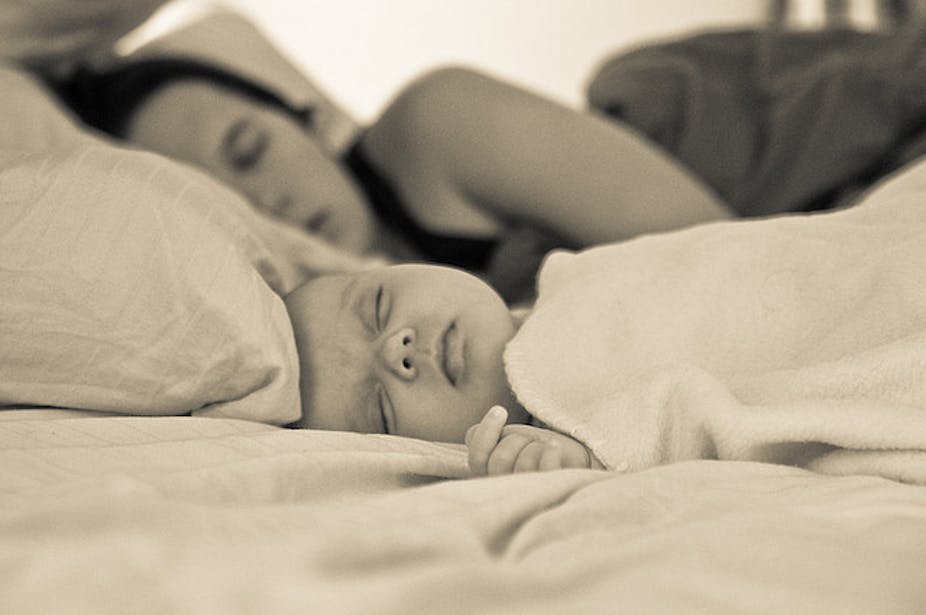Most parents will tell you that as soon as they announced their pregnancy, the advice started rolling in. Much of it might have been sensible and evidence-based, but it’s difficult to sort the myths from realities.
Given so much of a new parent’s life is spent settling infants and working out their rapidly evolving sleep patterns, questions soon arise about how to get a baby to sleep, where they should sleep, and for how long.
For many parents, bed-sharing becomes a workable option to settle their infant and to gain much-needed sleep. But is it worth the risks?
Sharing a bed with an infant is a risk factor for SIDS, the unexpected and sudden death of an infant during sleep. While a public health campaign has successfully promoted strategies to reduce the risk of SIDS in Australia by 80%, many parents still sleep alongside their infants.
SIDS and Kids brochures state that “sharing a sleep surface with a baby increases the risk of SIDS in some circumstances”. Specifically, “babies who are most at risk of sleeping accidents whilst sharing a sleep surface are babies less than three months of age, and babies born preterm or small for gestational age (low birth weight)”.
Sleep patterns
In March 2010, a national Galaxy Research survey commissioned by Proctor and Gamble asked 2,000 mothers with babies and toddlers aged up to two years about their sleep patterns. My colleagues and I conducted an analysis of 1,000 responses, randomly selected to ensure diversity in age, location and socioeconomic background.
The mothers’ responses highlighted the challenges of getting an infant to sleep, with 92% reporting difficulties at some stage. Of this group, 24% regularly or always struggled to get their infants to sleep. Night waking was a common occurrence, with 51% of the babies waking at least once during the night.

Just over half (58%) of the infants slept for six to seven hours per night, while one-third (31%) of the infants slept for four to five hours.
Not surprisingly, many of the mothers said they felt tired (46%). This sense of sleep deprivation resulted in feelings of exhaustion (75%) and irritability (70%). The mothers identified they had lower levels of patience (63%) and greater feelings of frustration (27%) than before giving birth. For just over a third (37%), additional strain was being placed on the relationship with their partner.
The mothers used numerous strategies to encourage their infants to sleep. These included rocking and patting (51%), giving a feed (46%), using a dummy (47%), putting baby in a cot (57%) and allowing their infant to fall asleep in their arms (48%). Just under half (41%) used bed sharing as a strategy to get their infants to sleep.
Reducing the risks
The advice from clinicians and public health experts on co-sleeping is based on evidence and policy: have your baby sleep in your bedroom for the first six to 12 months but not in your bed.
But additional advice is needed to minimise the risk when parents make the decision to bed-share with their infants or see it as a last resort to getting some sleep.
Our research found that for many women use bed-sharing as an infant-settling strategy, driven by a desperate need for sleep. These findings are supported by a 2002 study which identified that 80% of the 253 parents studied at some stage shared a bed with their infant.
So how do we best inform parents about the risks of sharing a bed with their infants? Let’s start with the basics:
Put your baby on his back to sleep (never on his tummy or side)
Make sure his head is uncovered during sleep
Keep the sleep environment smoke-free, and
Provide firm and safe bedding.
In addition to these now well-accepted safe sleeping guidelines, SIDS and Kids recommends you avoid sharing a sleep surface with your baby if:
You’re a smoker
You’re under the influence of alcohol or drugs that cause sedation
You’re excessively tired
Other children are sharing the bed with a baby
The baby could slip under bedding (such as pillows or doonas)
The bed is a waterbed or if the mattress is too soft
The sleep surface is a sofa or chair
Your baby could become trapped between the bed and the wall or the bed rails, or
Your baby may fall off the bed.
It’s important that all parents know not only the risks of bed-sharing but ways to minimise the risk if they choose to share a bed with their infant.

